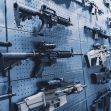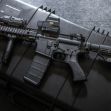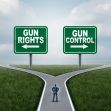The 9th Circuit federal appeals court struck down a California law that banned individuals under the age of 21 from purchasing centerfire semi-automatic guns. The 2-1 split decision stated the law was unconstitutional and called it a “severe burden” on Second Amendment rights of "self-defense in the home."
Individuals over 18 years of age will now be able to buy semi-automatic guns after acquiring a hunting license. Those serving in the U.S. military or law enforcement can bypass this licensing requirement. However, the federal court ruling does not affect a separate California law that bans individuals under 21 from purchasing handguns.
Writing for the majority, Judge Ryan D. Nelson noted that “young adults have Second Amendment protections as persons who are part of a national community” and even opened his opinion by crediting the survival of America to “the heroism of the young adults who fought and died in our revolutionary army.” This was to counter a lower court federal judge in San Diego who upheld the law by arguing that those under 21 were “believed unfit” for “responsible firearm possession and use.”
Concurring with Judge Nelson, Judge Kenneth K. Lee wrote that “the legal position has no logical stopping point and would ultimately erode fundamental rights enumerated in the Constitution.” Judge Lee continued to say that this rule would become “a blanket ban for everyone except police officers and service members” between the ages of 18 and 21.
This law to ban young adults from possessing semi-automatic rifles was signed by California Governor Gavin Newsom during his first year in office. It was a direct response to the Marjory Stoneman Douglas High School shooting in Parkland, Florida. Nikolas Cruz, the gunman, had legally purchased the AR-15 semi-automatic rifle he used in the attack. The shooting is the deadliest high school shooting in U.S. history, killing 17 and injuring 17 others.
The lawsuit challenging the ban was filed in 2018 by Matthew Jones, a 20-year-old resident of San Diego. Originally, Mr. Jones had filed a complaint arguing solely against the requirement for first acquiring a hunting license before buying any gun. However, the lawsuit was amended shortly after filing to also add in the under-age ban on semiautomatic weapons when the law was signed by Governor Newsom.
The Firearms Policy Coalition (FPC) assisted Mr. Jones with filing the lawsuit. FPC is a 501(c)4 non-profit organization with a goal to “create a world of maximal human liberty and freedom” and to “galvanize the People to draw a line and reject the condition of government expansion and interference with the People’s rights and liberty.”
Prior to 2008, the Second Amendment’s “right of the people to keep and bear arms” was interpreted under “the collective rights theory,” which held that U.S. citizens didn’t have an individual right to possess firearms. The government, from the local to the federal level, could regulate access to firearms without violating the Constitution. This theory of the Second Amendment was codified by the Supreme Court in 1939 in the case United States v. Miller.
However, in 2008, the Supreme Court issued a ruling changing the course and theory of the Second Amendment in the case District of Colombia v. Heller. The case challenged a District of Colombia law that prohibited individuals from possessing handguns. The Supreme Court decision shifted the interpretation of the Second Amendment right to that of an “individual right theory” in which an individual does have a protected right to possess firearms.
As of 2022, California has the strictest state gun laws and the seventh-lowest rate of deaths caused by gun violence. Other states that have some of the strictest laws on gun possession and carry include Illinois, Connecticut, Hawaii, Maryland, and Massachusetts. When it comes to writing and enacting legislation, states with more lenient gun laws are focusing more on gun safety than on restricting access to guns.






